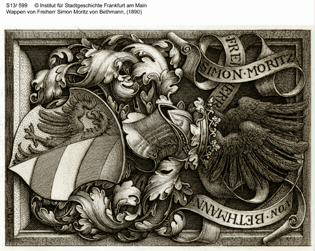Bethmann family

1890 engraving of Bethmann coat of arms
|
|
| Ethnicity | German |
|---|---|
| Current region | Hesse |
| Place of origin | Goslar |
| Members | Konrad Bethmann, Johann Philipp Bethmann, Simon Moritz Bethmann, Johann Jakob Bethmann, Simon Moritz von Bethmann, Moritz von Bethmann, Johann Philipp Freiherr von Bethmann |
| Connected families | Bethmann-Hollweg |
| Traditions | Banking, trade, diplomacy and philanthropy |
| Name origin and meaning | Collector of voluntary taxes |
The Bethmann (pronounced BETT-mon) family has been remarkable for the high proportion of its males who succeeded at mercantile or financial endeavors. This family trait began in medieval northern Germany and continued with the Bethmann bank which Johann Philipp Bethmann (1715–1793) and Simon Moritz Bethmann (1721–1782) founded in 1748 and soon catapulted into the foremost ranks of German and European banks. Even after the bank's sale in 1976, there are von Bethmanns engaged in commercial real estate and forestry in the 21st century.
The most notable of the Bethmanns was Simon Moritz von Bethmann (1768–1826): banker, diplomat, politician, philanthropist and patron of the arts. His sister Maria Elisabeth was the mother of Marie d'Agoult and the grandmother of Cosima Wagner; his sister Susanne Elisabeth, the great-grandmother of Theobald von Bethmann-Hollweg.
The Bethmann family, which produced the famous Bethmann banking dynasty, resided in Frankfurt am Main from the early 18th century onward. Earlier ancestors had come from the northern German town of Goslar. There – as burghers but not feudal nobility – the Bethmanns were among the upper crust of urban families. As such, they were entitled to delegate representatives to the town council and to bear a coat of arms; the earliest mention of the Bethmann name in Hanseatic Goslar – in the registrum parochianorum, a compendium on wax tablets of the town's parishioners – dates back to a Heinrich Bethmann in 1416. The surname "Bethmann" likely was an occupational name, like "Bäcker"/"Baker", given to collectors of the bede penninc, a tax requested (erbeten) from freemen in the Middle Ages.
Subsequently other Bethmanns – a Tile, a Bartold, a Hans and an Albrecht – appear in the records of Goslar, as owners of houses on Stonestrate and Korngasse, and as witnesses in the sale of houses. Another Tile buys a house on Knochenhauerstraße in 1492, serves on the town council, and is mentioned ten times between 1503 and 1520 as Munteherr, the title of an official responsible for minting of specie and weighing the metals produced from mining.
...
Wikipedia
